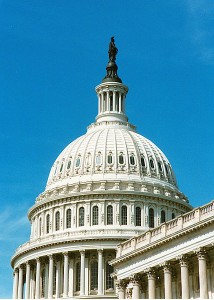On the Hill: Congress Acts in Wake of Deteriorating International Religious Freedom Situation

When most people think of the countries where religious rights are under threat, they think of the Middle East and countries like Saudi Arabia, where atheists and religious minorities are under constant threat of violence and state repression because of their religious views.
But one of the leading offenders in the repression of religious rights is Russia, which earlier this year arrested an atheist for “offending the sentiments of Orthodox believers.” And just this week, Russia enacted new restrictive laws that would prohibit individuals from sharing their faith in their own homes, on the Internet, in the media, or in any place other than a government-recognized church. While these new restrictions are part of an anti-terrorism measure meant to fight religious extremism, their practical impact is a gross violation of the human rights of the Russian people.
The US Congress, which has been debilitated by hyper-partisanship, is thankfully taking action on the issue of religious freedom, and is doing so in a truly bipartisan and pluralistic way. Just this week, Congress held both a hearing on the impact of blasphemy laws and a markup of H. Res. 290, a bill designed to oppose blasphemy laws and that includes specific language to protect not only religious minorities, but also humanists, atheists, and other nontheists.
The hearing on blasphemy laws was sponsored by the Tom Lantos Human Rights Commission, which is chaired by Rep. Joseph Pitts (R-PA). Incidentally, Pitts was honored last year with the American Humanist Association’s International Religious Freedom Award. At the hearing he reaffirmed his—and the American government’s—commitment to protecting religious freedom, stating: “We have recognized that these same basic rights, which are inextricably linked with the broader right to freedom of expression, should belong not just to Americans, but to all people regardless of creed or nationality.” The Democratic co-chair of the Commission, Rep. Jim McGovern (D-MA) echoed these sentiments and took pains to note that these bad laws don’t just exist abroad. “The US actually still has blasphemy laws on the books in some states, including my own state, Massachusetts, though the First Amendment prohibits their enforcement,” he noted.
While these and other statements made at the hearing were comforting for many religious communities both here and around the world, religious freedom advocates were even more enthused by the markup of H. Res. 290 by the Subcommittee on Africa, Global Health, Global Human Rights, and International Organizations. The resolution recognizes that “blasphemy laws inappropriately position governments as arbiters of truth or religious rightness as they empower officials to enforce particular religious views against individuals, minorities…” and therefore calls on “the President and the United States Department of State to make the repeal of blasphemy laws a priority in its bilateral relationships with all countries that have such laws through direct interventions in capitals and in multilateral forums.”
While Congress still has a way to go before passing the resolution, the markup of the bill and the hearing on blasphemy laws at least shows that this is an issue of concern for the federal government. Hopefully, Congress will continue to act on these issues in an inclusive manner and serve as an example to the rest of the world when it comes to protecting the religious rights of all human beings.
